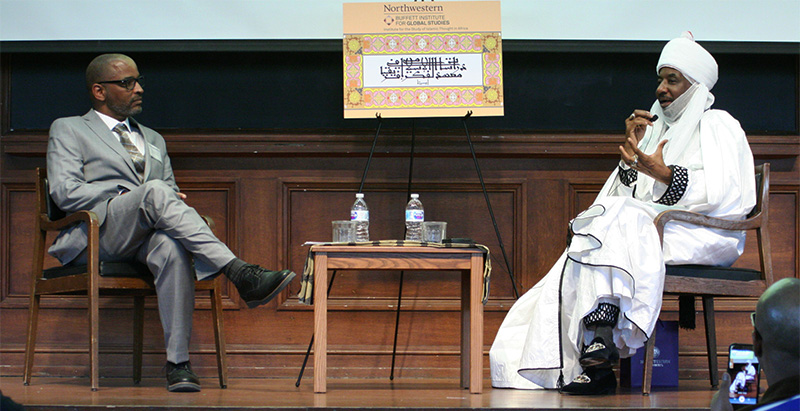Zachary Wright named incoming director of ISITA
Northwestern’s Office for Research has appointed Zachary Wright, professor in residence and associate dean for faculty affairs at Northwestern University in Qatar, as the next director of the Institute for the Study of Islamic Thought in Africa (ISITA). The appointment is effective September 1, 2025, when the term of the current director, Zekeria Ahmed Salem, ends. Wright is a scholar of African and Islamic studies. His research focuses on Islamic intellectual history in West and North Africa, from the fifteenth century to the present. Most of his field research based in Arabic, French, and Wolof language sources, has been conducted in Senegal and Morocco, with work also in Egypt, Mauritania, Ghana, Nigeria, Ivory Coast, and South Africa. A faculty member at Northwestern University in Qatar (NU-Q) since 2010, Wright teaches courses on Islam in Africa, African history, Islamic intellectual history, and Islamic revivalist movements.
Wright is a scholar of African and Islamic studies. His research focuses on Islamic intellectual history in West and North Africa, from the fifteenth century to the present. Most of his field research based in Arabic, French, and Wolof language sources, has been conducted in Senegal and Morocco, with work also in Egypt, Mauritania, Ghana, Nigeria, Ivory Coast, and South Africa. A faculty member at Northwestern University in Qatar (NU-Q) since 2010, Wright teaches courses on Islam in Africa, African history, Islamic intellectual history, and Islamic revivalist movements.
At NU-Q, Wright developed and chaired both the Middle East and Africana Studies minors and participated as a key member of the NU-Q Faculty Review, Reappointment and Promotion Committee. In 2022, he was appointed associate dean for faculty affairs at NU-Q. Wright received his PhD in history from Northwestern University, his MA in Arabic studies/Middle East history from the American University in Cairo, and his BA in history from Stanford University.
“I am honored and excited to take on this role for ISITA, an institute that shaped my own formation as a scholar,” Wright noted. “To my knowledge, ISITA is the only academic institute devoted to the study of Islam in Africa; it is unique in the world, and a marker of distinction for Northwestern. From John Paden, Ivor Wilks, and John Hunwick, to Souleymane Bachir Diagne, Muhammad Sani Umar, Rüdiger Seesemann, Rudolph Ware, and Zekeria Ahmed Salem, some of the most transformative scholarship on Islamic Africa has long been associated with Northwestern’s ISITA and Program of African Studies.”
Wright will assume a role held since 2017 by Zekeria Ahmed Salem, associate professor of political science. Under Ahmed Salem’s leadership, ISITA implemented a vibrant programming agenda, bringing authors of new books on Islam in Africa to campus on a regular basis, as well as prominent figures in African Muslim intellectual life, including His Highness Lamido Sanusi, the Emir of Kano (Nigeria), and Hamza Yusuf Hanson, co-founder and president of Zaytuna University (California).
During Ahmed Salem’s tenure partnerships were launched or renewed with the University of Illinois, Harvard University, University of California, Berkeley, University of Nantes, and the University of Hamburg, resulting in collaborative projects, international conferences, and several joint publications. These include a special issue of the journal Religions (2021) (co-edited with Ousmane Kane) titled “Africa, Globalization and the Muslim Worlds” and a volume of translated and annotated writings by African Muslims titled West African Responses to European Occupation in Arabic and Ajami Texts (with Bruce Hall and Mauro Nobili, Brill, forthcoming, 2026). Other highlights of Ahmed Salem’s directorship include hosting a book development workshop for early career scholars of Islam in Africa and the creation--with the University of Illinois--of Maktaba, an online collection of West African Arabic manuscripts in English translation from the two universities’ libraries. The development of Maktaba was supported by a grant from the National Endowment for the Humanities.

Zekeria Ahmed Salem (left) interviews His Highness Lamido Sanusi, Emir of Kano, during the latter's visit to campus in 2018.
“It has been the honor of my life to serve as director of ISITA for eight years,” said Ahmed Salem. “This is such a rare, humbling privilege among experts of Islam in Africa the world over. I am proud of the work we did--along with program staff and affiliated faculty--to revive such a unique research center. I am also confident that my colleague Zachary Wright, himself a product of ISITA, will build on the work of our many stellar colleagues to write what will no doubt be an exciting new chapter in ISITA and Northwestern’s long history of engagement with African intellectual and religious life. As I focus on my own research, teaching, and departmental duties, I will remain fully engaged, as an ISITA faculty affiliate, with the work my esteemed successor and friend initiates with other colleagues across campus.”
Wright will direct ISITA while remaining resident in Qatar (albeit with more regular visits to Evanston), relying on the assistance of ISITA associate director Rebecca Shereikis.
“I look forward to building upon the work of Zekeria Ahmed Salem and that of previous directors to shape future development of the field,” said Wright. “This is also an important opportunity to build strong connections between faculty in Doha and Evanston through collaborative research and programming.”
Wright is the author of several books, including The Chronicles of Two West African Kingdoms: the Tārīkh Ibn al-Mukhtār of the Songhay Empire and the Tārīkh al-fattāsh of the Caliphate of Hamdallahi (with Mauro Nobili and Ali Diakite, Liverpool, UK: The British Academy, forthcoming 2025/2026); Realizing Islam: the Tijaniyya in North Africa and the Eighteenth-Century Muslim World (University of North Carolina Press, 2020); Jihad of the Pen: the Sufi Literature of West Africa (with Rudolph Ware and Amir Syed, American University in Cairo Press, 2018); and Living Knowledge in West African Islam (Brill, 2015). His scholarly articles have been published in the Journal of African History, Journal of Islamic Studies, Journal of Africana Religions, Islamic Africa, and International Journal of African Historical Studies.
Launched in 2000, ISITA is one of Northwestern’s approximately 35 University-wide research institutes and centers that harness faculty knowledge from across departments and schools. Its mission is to sponsor and facilitate collaborative interdisciplinary scholarship, programming, and publications on the Islamic tradition of learning in Africa and to promote a broader awareness of the role of Islam in African societies, past and present.